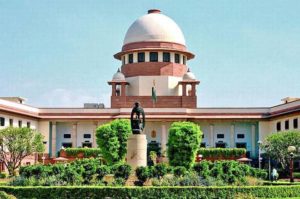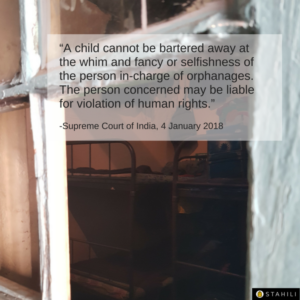Supreme Court of India highlights the problem of orphanage trafficking

The problem of orphanages has received growing judicial attention in India, a country where large numbers of children live in residential care institutions, many of them unregistered and privately run. Now, in a new and significant development, the Supreme Court of India has spoken again on behalf of India’s children, this time on the subject of child trafficking and orphanages.
In the face of mounting concern for India’s children, the latest decision arises from a petition for special leave by the National Commission for Protection of Child Rights (NCPCR). The petition was against a Calcutta High Court order staying its proceedings in a case related to the State of West Bengal, where the Additional Solicitor General submitted that “there has been trafficking of orphans and the children are being sold”.
The NCPCR argued that the West Bengal government had illegally formed ad hoc committees for adoption and given away orphans for adoption in gross violation of the law. The Supreme Court accepted the special leave petition, finding that the issue of trafficking of children is “a vital national concern and recognises no boundary”. The Court opined that:
“…[w]hen the children are sold, nothing can be more disastrous than this. This is a situation which cannot be allowed to prevail. A right of a child in a society is sacred, for the future of the country depends upon the character and the destiny of the child and the state has a great role in that regard. It is in the realm of protection.”
In its decision, the Supreme Court found it appropriate to address the special leave petition, noting that trafficking of children is “a vital national concern and recognizes no boundaries”. In so doing, it expanded the scope of the petition filed by the NCPCR and determined that it was necessary to have a comprehensive review of the operation of orphanages throughout the country, the mode and method of adoption, and the treatment and care which is given to children. It added all states as respondents in this case, ordering them to respond with details about orphanages and facilities and also the procedures followed in giving children up for adoption from these facilities.
The Supreme Court observed that the issue of child trafficking is essentially about the dignity and rights of the child: “A child cannot be bartered away at the whim and fancy or selfishness of the person in charge of orphanages.”
The Court went on to indicate that it may also look at certain aspects pertaining to the protection of human rights, namely the establishment of human rights courts and the appointment of special prosecutors as mandated by law. The Court noted that “in that regard, [it] would like the responses of all the States”.
This decision follows the recent announcement of the adoption of new anti-trafficking legislation and a 2017 order of the Supreme Court which directed states and territories in a case highlighting a number of all too familiar and disturbing trends of sexual abuse and exploitation of children in orphanages, as well as a lack of proper documentation and available data on children living in residential care institutions, among other matters. The Supreme Court ruled that all orphanages must be registered and a database of children in care be established.
The Supreme Court has listed the most recent matter for 22 January 2018. Stay tuned for more updates on this case and other legal developments regarding the issue of child trafficking to and from orphanages.
